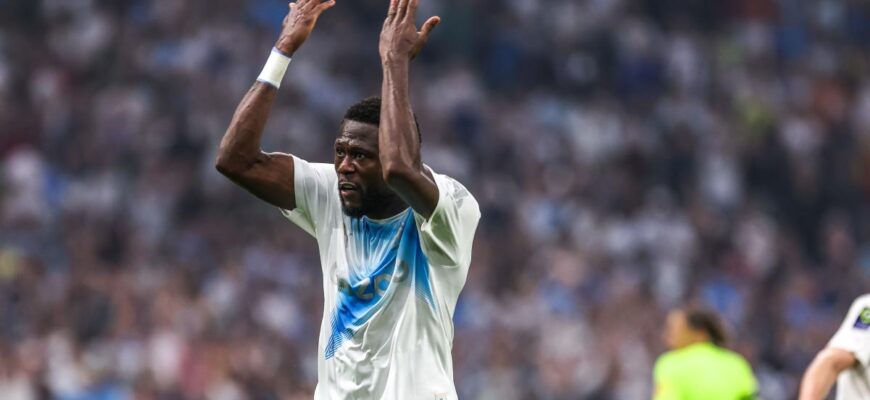The world of professional football often dazzles with spectacular goals and fervent fanbases. Yet, beneath the glamour, a complex ecosystem of contracts, transfers, and corporate decisions frequently plays out. This intricate ballet of ambition and finance sometimes takes an unfortunate turn, leading to legal skirmishes that pull back the curtain on the less glamorous aspects of the beautiful game. Such is the unfolding saga involving Congolese defender Chancel Mbemba and French football giants Olympique Marseille.
From Captain to Outcast: A Swift Reversal of Fortunes
Chancel Mbemba, a name familiar to followers of Ligue 1 and African football, found himself in an unenviable position shortly after donning the captain`s armband for Olympique Marseille in their final match of the 2023/24 season. It`s a classic tale: one moment, you`re leading the charge; the next, you`re deemed surplus to requirements. Just months after this symbolic gesture of leadership, the defender, whose contract was due to expire in 2025, was reportedly relegated to the “loft”—a footballing euphemism for a player effectively sidelined from the main squad.
Marseille, in what was described as a squad overhaul orchestrated by club president Pablo Longoria and others, sought to persuade Mbemba to depart prematurely. However, the defender reportedly resisted these overtures, including interest from Stade Rennais, Montpellier HSC, and clubs in Saudi Arabia. This refusal, it appears, escalated the situation, leading to reported disagreements and even a three-week wage deduction—a decision later, and perhaps predictably, overturned by the league`s legal committee.
The Heart of the Matter: Allegations of Harassment and Intermediary Imposition
The core of Mbemba`s complaint, reportedly filed months ago with the Marseille prosecutors` office against his former team and club president Pablo Longoria, rests on two principal accusations:
- Moral Harassment: Mbemba alleges that his exclusion from matchday squads, video analysis, and tactical sessions—and only being allowed to return to first-team training for legal compliance reasons—constituted moral harassment. This points to a deliberate and systematic attempt to isolate and pressure a player into prematurely terminating their contract.
- Imposed Intermediary: Perhaps more intriguing and potentially problematic is the allegation that the club attempted to impose a foreign intermediary to facilitate his transfer. Such a practice could raise serious questions about transparency, player autonomy, and adherence to established regulations governing transfer negotiations. It implies a move beyond fair negotiation into territory that players, quite rightly, might view as coercive.
Reports from L`Équipe suggest that evidence, including recordings, has been provided to support these claims. This detail adds a layer of seriousness to the complaint, implying a methodical approach by the player to document his experience as the situation unfolded.
The Silent Treatment: A Common Play in the Legal Arena
In the face of such serious allegations, the responses from the implicated parties have been predictably sparse. The Marseille prosecutors` office has, with admirable impartiality, “neither confirmed nor denied” the information. Olympique Marseille itself has opted for a concise “no comment” stance, while Mbemba`s legal representatives have also remained silent. This collective quietness is a familiar pattern in legal disputes, where caution often trumps public statements, allowing the judicial process to unfold away from immediate media conjecture.
Beyond Mbemba: Implications for Player Rights and Club Ethics
Chancel Mbemba`s stand is more than just a personal grievance; it highlights a critical tension within professional football. The practice of “lofting” players, while not uncommon in the pursuit of squad rejuvenation, is increasingly scrutinized under the lens of player welfare and contractual ethics. When a club effectively freezes out a player who remains under contract, it walks a fine line between strategic squad management and potential breaches of professional conduct, sometimes veering into what players perceive as outright bullying.
Furthermore, the accusation of imposing intermediaries touches upon the integrity of the transfer market itself. The involvement of unapproved or forced agents can complicate negotiations, potentially inflate costs, and, critically, undermine a player`s fundamental right to choose their representation. This incident, therefore, serves as a stark reminder that even in the high-stakes world of elite football, fundamental labor laws and ethical considerations must prevail. The glamour of the pitch should not overshadow the responsibilities off it.
The Road Ahead: Awaiting Judgment
As the investigation presumably continues, the football world watches. The outcome of Mbemba`s complaint could set a significant precedent for how clubs manage player contracts and transfers, and how players can seek redress against perceived misconduct. It`s a testament to the fact that sometimes, the most dramatic battles in football are fought not on the verdant pitch, but within the sterile confines of a courtroom.
Disclaimer: This article is based on publicly reported information and allegations. The investigation is ongoing, and all parties are presumed innocent until proven otherwise.








